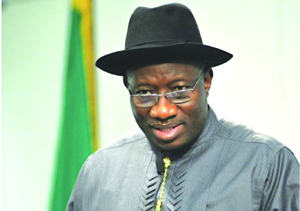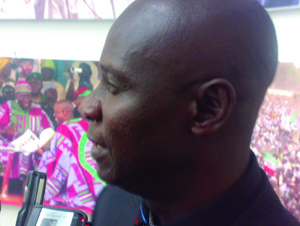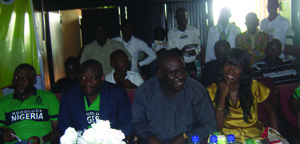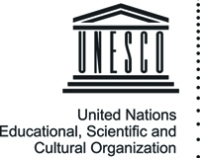
The venue was the auspicious New Expo Hall of the Eko Hotel and Suites in Lagos and the occasion was as novel as it was interactive.
It was novel in that it was perhaps the first time Nigerian artistes, other than those who branched out into the political clime, had come close to the seat of power; the very first time the sector’s practitioners were gifted the power to reshape their battered industry.
These are indeed the best of times for the arts sector as since the past four months or thereabout, it appears the present administration has developed a rather soft spot for the culture industry beyond the mere lip service and dress rehearsals that its practitioners have become accustomed to.
First it was the surprise $200 million intervention for the art and entertainment facilitated by the administration, followed by the book reading promotion initiative by President Goodluck Jonathan, then the various stakeholders conferences, and now the all stakeholders parley with the President aimed at evolving a framework for the industry’s growth.
To therefore submit that the artistes seized the august opportunity presented by the Eko Hotels parley with both hands would have ventured the obvious because that chance hugged by all who mounted the rostrum to address President Jonathan on the peculiar challenges faced by their genre.
It was so interactive that even footballers were not left out of the clamour to air their grievances to which spokesman Austin Eguavoen did justice to after the President noted that football too involved some level of creative and was in his words ‘also an art’.
Before now practitioners in the creative sector in Nigeria have been slammed with the talkers’ tag, that had sadly become their lot by virtue of the fact that neither the government at all tiers nor the corporate sector have reckoned with them or their opinions in policy formulations or implementations even in matters concerning their own development and welfare.
For a sector believed to employ the biggest workforce outside of the public service as well as having placed the country on the global map of recognition, the arts in Nigeria has suffered systematic neglect or would be appropriately termed serial abandonment perpetrated by successive regimes in the country.
It was joked around in the sector that ministers that were not considered suited for any portfolio were drafted to the culture sector to while away the time and those considered good enough were still drafted to the culture ministry only temporarily to learn the ropes.
It is against this backdrop of previous happenings in the art industry that the Monday, March 21 gathering of stakeholders in the various genres of the art in Nigeria is highly commendable.
For as some artistes commented, it is an Obama-like occurrence that has only happened once in a lifetime of most if not all the artistes present that a Head of State of Nigeria is in the midst of artistes not to be entertained but to hear their problems and challenges.
“(Sic)This na the first time in my life wey I see a President siddon with artistes for the same house, na wao,” remarked Comrade Victor Asaolu, of the Association of Nigerian Theatre Arts Practitioners (ANTAP).
The Monday event tagged: An interactive evening with President Goodluck Jonathan, was intended as a platform for the practitioners in the various genres of art through their umbrella bodies to present papers highlighting peculiar challenges faced by either their own genres or the arts in general which would be collated to form or articulate government’s policies as it affects the industry.
And President Jonathan may well have been overwhelmed by as much the level vexation conveyed by the speaker after speaker as the multifarious problems enumerated by the practitioners; some he probably assumed did not exist going by the feedbacks his ministers and parastatals‘ heads brought back to him.
Indeed, it could aptly have been described as a no-holds barred meeting with the number one citizen of the country by the supposedly and previously assumed lowliest of sectors. And, the artistes did not mince words in presenting their own side of a story that had been wrongly told by appointed government officials.
As much as every umbrella body in the art and entertainment industry was fully represented in the hall, spokespersons were the very top notch in the industry, thus, there may not be any case of under-representation or suppression of opinion, just as it was also observed that Jonathan did take down notes during every presentation by the speakers.
Mr. Bond Emeruwa director of the Nigerian Guild of Directors, representing the film industry in opening the floor cited the case of the non passage of the Revised Nigerian Film Policy which according to him if implemented was meant to address some lapses in the film industry and also the need for a Nigerian Film Village, just as Busola Holloway of the Independent Television Producers Association of Nigeria (ITPAN) lamented the rate at which indigenous production firms were daily losing jobs to their foreign counterparts in the country urging the President to intervene and correct the anomaly as Nigerians in turn were losing their jobs.
“Even adverts and commercials about local products are given to foreign when we have the capacity to do an even better jobs. Nigerians are losing their jobs on a daily basis to these foreign firms and it is not acceptable. If they say we are not good enough to produce their commercials then they may as well take it somewhere to air instead on our own television,” the industry’s spokesman submitted.
On their part, the motion picture producers stressed the need to channel the intervention into supporting infrastructure already on ground with the practitioners rather than wholly funding films production, while the National Association of Theatre Arts Practitioners (NANTAP) through its president Mr. Greg Odutayo chose to revisit the moribund Endowment Fund for the Arts and the controversial fate of the National Theatre which dangles between privatization and commercialization to the detriment of theatre arts practitioners.
Talk show host, Ms. Mo Abudu on her part and to the wild cheers of the audience urged the President to look into the Nigerian Television Authority (NTA) as the parastatal ‘may have lost focus from the original ideals setting it up.
“Mr President we want you to look at the NTA. Because all it does is sell airtime. It does not buy programmes or encourage the production of programmes by independent producers. Do something with the NTA to make it work,” said Abudu.
The Society for Nigerian Artists, the umbrella body of visual artists in the country asked the President for a befitting national gallery that can hold the works of great Nigerian contemporary artists, while also urging Jonathan to appoint artists into positions of authority to properly develop the sector, such as preventing the exploitation of artists at the national Theatre with high rents which he posited was supposed to be an infrastructure of the artists.
For the literary genre, the clamour was for the completion of the much hyped writers’ village, which the Association of Nigerian Authors (ANA) national vice chairman, Mr. Sunday Ododo, maintained would position Nigeria as the literary capital of Africa.
African Movie Academy Awards initiator Peace Anyiam Osigwe wondered before the president why a film producer is charged exorbitant fees to shoot before landmark sites in the country, as she believes the films made with the shots tended to promote the country in the long run, while also asking the President to compel the corporate sector to buy into the Brand Nigeria theme by endorsing products from the country’s indigenous firms, which according to her they had been shirking away from.
The Coalition of Relevant Arts (CORA) highlighted its demands as the need for a book commission, clarification of the true beneficiaries of the intervention fund, making budgetary allocations based on the economic relevance and revenue generation by sectors which would see, according to spokesman, Mr. Ben Tomoloju, the culture getting ,more in terms of its high turnover.
However, in all the submissions, the issue of piracy as it affected intellectual property rights topped the evening’s presentations as most sectors blamed the anomaly for the impoverishment of the industry’s practitioners, with some speakers like comedian Ali Baba, calling prison terms for culprits.
Ali Baba was not alone in that school of thought as the Tony Okoroji, Stephanie Okereke, Emmanuel Isikaku, Zeb Ejiro, and Victor Asaolu, believed checking piracy would go a long way in ameliorating the lot of the Nigerian artist beyond any other demand being made on the evening.
And as if re-echoing the mindset of the audience, President Jonathan, responding, said the issue of piracy from what he saw appeared to have even overwhelmed the relevant agencies of government tasked with the responsibility of regulating it.
According to him, there may be need to create more agencies and parastatals to address some of the these challenges.
“We have alot to gain if government can support the sector. Sometimes we don’t take it seriously but every president needs to take it seriously. Probably I think the government is a bit too far from you people who are in the industry.
‘As I am talking to you now I think government needs to be closer to you. I wonder who do you even talk to; is it the Information ministry, education ministry, culture and tourism ministry, which one? I totally agree with you that without handling the issue of piracy we have a long way to go. I’m not saying we should kill pirates, I believe we need to strengthen the law and set up a special body that can handle it,” the President stressed.



















